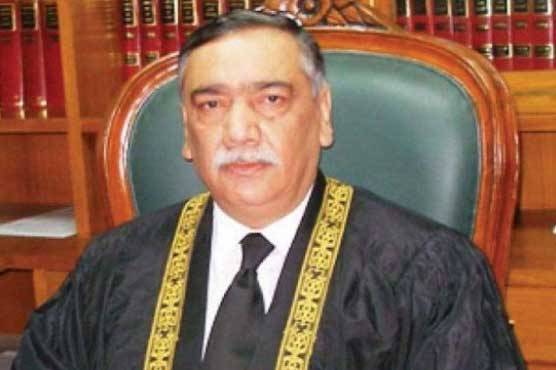ISLAMABAD - Chief Justice of Pakistan Justice Asif Saeed Khan Khosa on Friday observed that internment centres may have been formed under the doctrine of necessity but the court would review their constitutional status.
The Supreme Court yesterday asked the Attorney General of Pakistan to tell the reasons for the promulgation of KP Action in Aid (Civil Power) Ordinance, 2019.
A five-member bench of the Supreme Court headed by Chief Justice Asif Saeed Khosa asked this while hearing the federation as well as KP government’s appeals against the Peshawar High Court (PHC) verdict and the constitutional petition of the civil society against the KP Action in Aid (Civil Power) Ordinance, 2019.
The KP governor on August 5 had issued the ordinance and extended certain powers of the armed forces, which were available in the erstwhile Federal Administrative Tribal Areas (FATA) and Provincial Administrative Tribal Areas (PATA) while acting in aid of civil power to the entire province.
The Ordinance, 2019 was almost a reproduction of the two regulations promulgated by the President of Pakistan in 2011 for FATA and PATA through which legal cover was given to several detention centres set up during the military operations in different regions.
During the hearing, Justice Mushir Alam noted that in the preamble of the Ordinance it is written ‘miscreants are no longer loyal to the State.’ He questioned ‘were the miscreants loyal earlier’.
Attorney General Anwar Mansoor Khan informed about the rules and procedures of the internment centres. He said “Inmates of internment centres are treated in a manner, which is humane.” Medical facilities, clothing, food and religious teaching imparted to the interned persons, adding the KP prisons rules are applicable to the internment centres. Family members can visit their intimates on the condition that not to disclose information to others.
Chief Justice Asif Khosa remarked that what you are telling seems to be that it is not secret confinement and the rights are available to the inmates. On papers it is all right but whether the centres are set up in accordance with constitution, he questioned.
Justice Gulzar Ahmed observed that since 9/11 the international scenario has changed. “The new name crafted for the terrorists i.e. non-State actors. When they are non-State actors then whether their allegiance be with any country or the organisation whose members they are. In that context internment centres were set up in America and European countries. The USA established jail for them in Guantanamo Bay.” He asked the attorney general that you are trying to say you have evidence and the facts that interned persons are non-State actors.
The AGP informed that internees are rehabilitated and given Islamic teachings.
Justice Khosa stated that the main issue before this court is whether the people are kept in the internment centres legally and in accordance with the constitution. He said that the Peshawar High Court (PHC) had struck down the Ordinance and other laws as those are contrary to the constitution.
The chief justice said that if these are unconstitutional then we will not go with the arguments you are advancing under the doctrine of necessity.
The attorney general argued that in extraordinary situation where the State has to be protected and lives of people be saved from the miscreants require extra measures.
Justice Bandial said that people who are disobedient to the State can be detained, but the question is whether fundamental rights of inmates can be deprived.
Anwar Mansoor contended that the internment centres are not unconstitutional. The court observed then how they were set up.
Justice Khosa inquired was the procedure constitutionally and validly done.
The AGP instead of directly replying to the court query said that these people interned have fought with Pakistan Army. The Army secured the area and protected the people of those areas.
Justice Gulzar remarked that you mean to say they (inmates) are not entitled to constitutional guarantee.
Justice Khosa asked the attorney general that you are acceding that it (continuation of erstwhile laws for internment centres) was not unconstitutionally transferred. “I want to satisfy myself that how the legal position developed.” No one is saying that the terrorists are good people or courtesy be shown to them. “On the contrary we want that they be treated sternly,” he added.
Anwar Mansoor informed that the armed forces were called in Action in Aid of Civil Power in 2008. Justice Mushir Alam said that they have to be subservient to the authority and not to undermine the authority.






